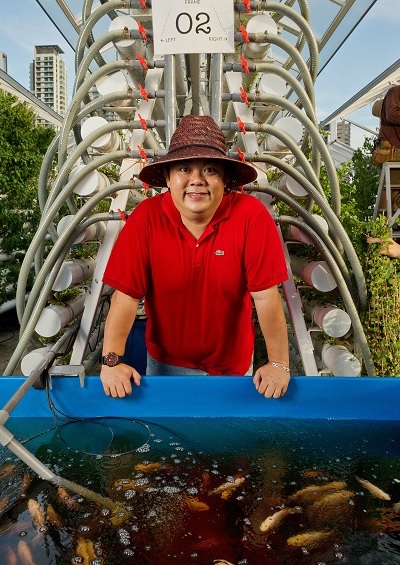Singapore Goes Green
A unique urban farming project thrives in the heart of Singapore.
November 7, 2015

Richard Koh considers photography a mystical art where “one harvests light from above”. Since leaving a career in engineering research in 2003, his photography has won him multiple awards from the Paris Photo Prize and international Press association, among others. He runs Amaranthine Photos, focusing on documentary and editorial work, including aerial photography.
Allan Lim, 42, is the founder of Comcrop, an urban farm spread across a 6,000-square-foot roof-top on Singapore’s downtown Orchard Road.
Comcrop, a social enterprise, uses “aquaponics” — a system of hydroponics — the process of growing plants in sand, gravel or liquid with the use of nutrients — that uses broken down bio-waste from fish and aims at recreating the ecosystem of a freshwater lake.
The farm’s output includes a range of herbs and vegetables, including basil, peppermint, spearmint, and several varieties of tomatoes.
Allan, who is also CEO and co-founder of Alpha Biofuels, a bio-diesel business, and co-founder of The Living! Project, a collective of artists, social innovators and designers graduated from Singapore’s Nanyang Technological University in 1999 with a degree in engineering.
Comcrop’s staff include two young Singaporeans, one a recent graduate and another about to begin her university studies, helped by a group of local senior citizens who help with harvesting and packing.
Text and photographs by Richard Koh
 Richard Koh considers photography a mystical art where “one harvests light from above”. Since leaving a career in engineering research in 2003, his photography has won him multiple awards from the Paris Photo Prize and international Press association, among others. He runs Amaranthine Photos, focusing on documentary and editorial work, including aerial photography.
Richard Koh considers photography a mystical art where “one harvests light from above”. Since leaving a career in engineering research in 2003, his photography has won him multiple awards from the Paris Photo Prize and international Press association, among others. He runs Amaranthine Photos, focusing on documentary and editorial work, including aerial photography.The Other Hundred is a unique photo-book project aimed telling the stories of people around the world who are not rich but who deserve to be celebrated.
The Other Hundred Entrepreneurs: 100 Faces, Places, Stories — the second volume in The Other Hundred series — focuses on the world’s everyday entrepreneurs. It captures the reality that small and medium-sized businesses, rather than tech billionaires or elite MBAs, contribute the majority of the world’s jobs, including half of all jobs in Africa and two-thirds in Asia.
The book offers an alternative to the view that most successful entrepreneurs were trained at elite business schools. Here are people who have never written a formal business plan, hired an investment bank, planned an exit strategy or dreamt of a stock market floatation. Some work for themselves, others employ a few people, still others a few hundred.
 The book’s 100 stories were chosen from a pool of 10,000 images shot in nearly 150 countries. The book is published by Oneworld Publications in London and is available in bookstores worldwide and online.
The book’s 100 stories were chosen from a pool of 10,000 images shot in nearly 150 countries. The book is published by Oneworld Publications in London and is available in bookstores worldwide and online.




